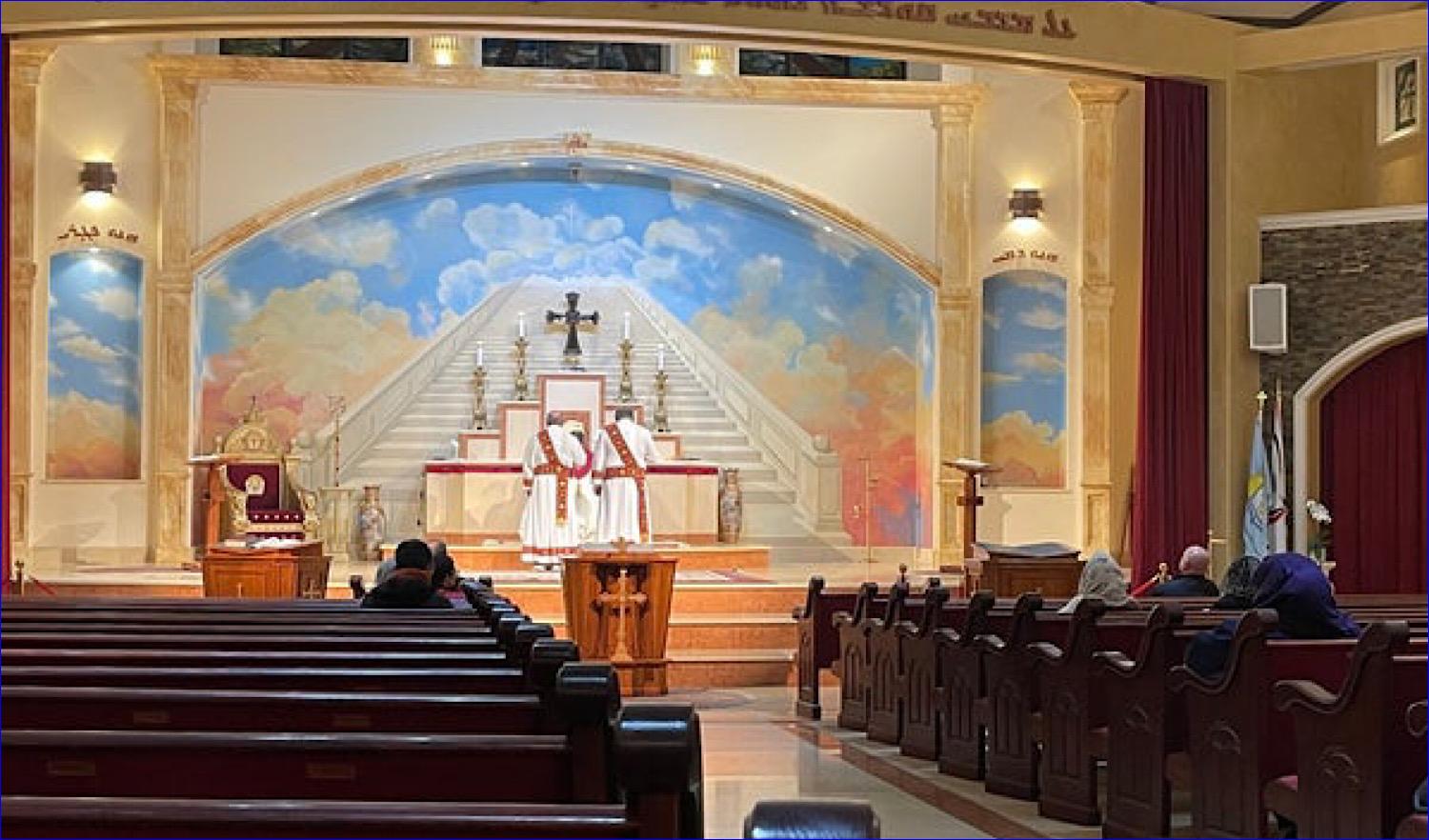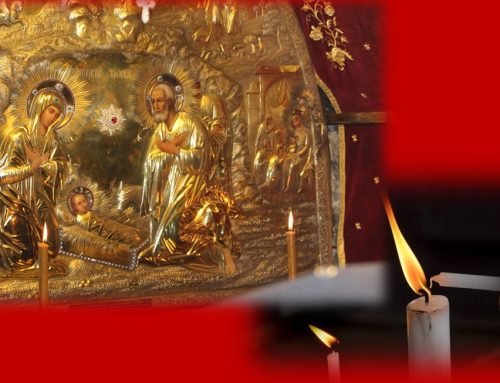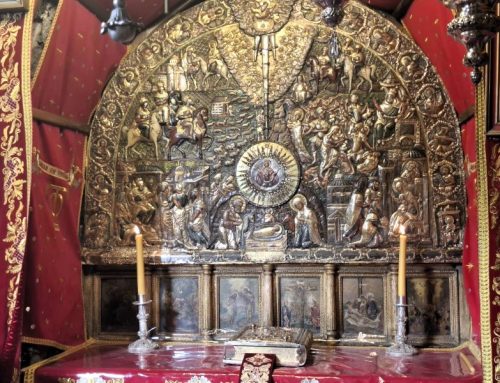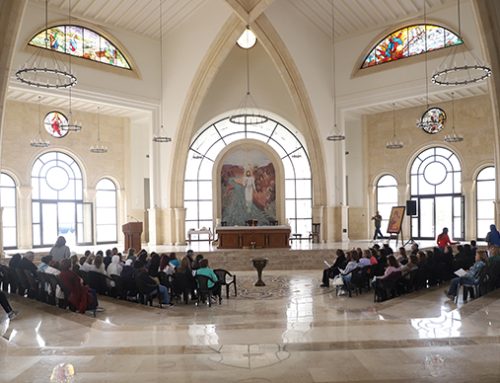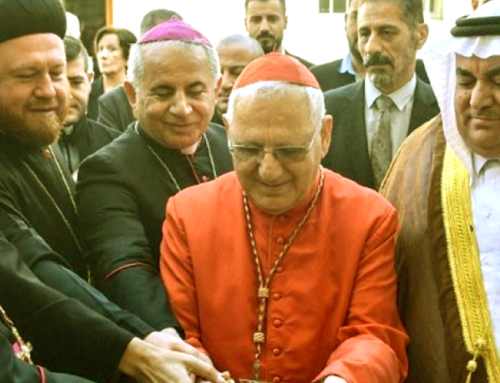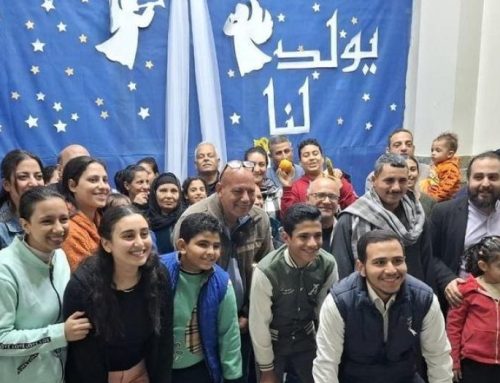I’m deeply honored to have had the opportunity to interview Father George Bet-Rasho of St Mary Assyrian Church of the East in Tarzana, CA. Father George gave me a tour of the Church grounds and he explained each biblical reference painted on the walls of the church inside as well as the Assyrian scripture peppered throughout the structure. The church also preserves several ancient texts and antiques of the Assyrian people from the Mesopotamian region that they originate from. They’ve been donated to the church by various institutions throughout the years. Outside next to the Church is a gift shop where one can buy replicas of Assyrian figures and artifacts, Assyrian flags, art by local Assyrian artists, and books on the history and ongoing plight of the Assyrian people.
The Interview
Q: What makes up the Assyrian identity? I’ve seen “Assyrian” and “Chaldean” being used as synonyms. I wanted to get your perspective on these two different terms.
Rev. Bet-Rasho: Depending on who you ask, but really, if you look at the facts and history the Assyrians existed before Christianity. We are the children of the Ninevites. People of Nineveh, we are their descendants. Assyrians became Christians in the first century. The Church was formed throughout the centuries. And by the second, third century, we see Assyrian Bishops in the region. And by 410, it was totally formed and it was a church all by itself, having its own hierarchy. This became known as the holy Apostolic Catholic Church of the East. The church of the East was part of the general church. There was one church existing in regions, whether it was in the West, Asia Minor in Europe, whether it was in the east, there was just one church. But in the year 431, a schism took place between our church which was in the Persian region, and the Roman church and the Greek church, which were in the Roman region. And so we became separated from the other church. And then that’s when the church grew. As the church grew, it became the largest church in existence. Between the sixth century and the 12th century, it was the largest church that existed all the way to where Afghanistan is today, Mongolia, China, Japan, all these regions. But the church of the east had a schism, which brings us to what we’re talking about, in the 17th century part of the hierarchy of the church and part of the members of the church adhered to Rome. So if I’m not mistaken 1551, 1552, the Pope called the people that left the church “Chaldeans”. And that’s where the word appeared again, in our history. up to then, there was no such name to these people. Even though the word “Chaldean” comes before Christianity. No one called themselves Chaldeans because this was just a city in the southern part of Mesopotamia. So it’s been 500 years, they’ve been calling themselves this. So if you really trace them, to where they’re from, they’re part of us, we’re all part of each other. And they are Assyrians. Some refuse to call themselves Assyrians, they say “we are chaldeans” and god bless them. It’s their decision. But I feel if you ask me personally, I feel we are one. So this is where the difference is. They are the Chaldean Church, we are the Church of the East, but we are all Assyrians if you ask me. We have the same language, the same culture, The same origin. If you really look at their practices, and the religion emptied out of Roman Catholic influences, is basically the same prayers, the same Fathers of the Church, the same everything. So, it’s hard to differentiate, if you especially look at some of the villages that live close together, you will not know unless they tell you. Or you might see for example, somebody in their churches now they have statues because of the Roman Catholic influence. But otherwise if they were just to pray as people and speak as people that live as people, you wouldn’t know who’s who. Because they are one in so many ways.
Q: And what would you say are specific cultural practices that would distinguish the Assyrian Church of the East markedly different from say, Christianity?
There are certain prayers. Specifically, born and originated in the church of the east, and are part of the identity of the Church of the East. We still use the Aramaic language in the church. And that by itself is totally different from any other language. And so that’s the one thing we take pride in, we tried to preserve, although it’s a struggle in this country, with the new generations. There are a few festivities that we still celebrate, for example, the church of the East fasts 20 days before the Great fast [known as Lent in Catholicism]. There’s a fast we call it the Rogation of the Ninevites. So 20 days before [The Great Fast] starts in our church, the entire Assyrian nation fasts for three days. And we call it the Rogation of the Ninevites because we tie it to the Ninevites, that fasted when Jonah came and said, they’ve been destroyed by God. And so they fasted. And that identifies us as descendants of Nineveh. We’ve fasted 700 years before Christianity. That’s one of the things that we take pride in, and we have. We also have a ritual which comes 100 days after Easter. We call it ‘Nusardil’, peace of God, which the Assyrians celebrated before Christianity, they would splash water on one another. And this celebration, we still do that. Now, we identify it as a site of baptism. But really this was before [Catholic] baptism. And again, that ties us to our ancestors and what we learned as Assyrians living in Nineveh before Christianity.
Q: What kind of obstacles does your community still face whether back in the homeland or here in the US?
It’s the same obstacles we’ve been facing for hundreds of years if not more than that. There is a certain group of people that don’t want us to exist, they do not want us to practice our faith, they do not want us to have rights on our lands. That’s been our struggle for hundreds of years. The fruit or the outcome of that has been diaspora; why we fled. Here it’s the melting pot we fear and the culture clash that we’re having. Parents being born and raised there, raising children here, it’s not that easy. And sometimes people abuse the freedom that they obtain, and do not know the value of it. And that’s been a problem, of course. And also, like I said, preserving the fruit that’s supposed to be in a certain climate, and a certain geographical location, somewhere else is not easy. You have to create that atmosphere. And that temperature and that ground and that sun needed for that fruit to be what it used to be and where it was supposed to be. But we refuse to give up. If you toss somebody in the middle of the ocean, what are they going to do? There’s hundreds and thousands of miles. But you know, they’ll try to swim. And that’s what we’re trying to do.
Q: Is the principal concern of Assyrian-Americans when it comes to their culture related to how the next generation will be influenced by their new home in America?
I think it’s the concern of all parents, as to where their children are. There are children that hang out in the church provided atmosphere, which are the youth groups that we have and bible study groups. There’s a small number hanging out with friends at hookah bars and places like that. Even schools are not that safe nowadays. Many have been introduced to drugs in schools. And so parents are worried. I mean, thank god here in our community, the influence of drugs and things and gangs is almost very minimal. I don’t think we have anybody associated with any gangs in our community. Probably very few thank God. There are some in other communities that we have, that have cost our people. They paid the price. They have children in gangs, jails and prisons; we have people who have overdosed, in other [Assyrian] communities. So yes, we worry, we try to do our best to save them, you know, to get them attracted to the righteous path. We have basketball leagues in Chicago, for example, we have different places to get them busy and off the streets and things like that. It works in many ways. Sometimes it doesn’t. It all depends on the individual and the family goes back to what I was saying. How are they raised, who’s raising them? And then we have broken families too. For example, 100 years ago, you wouldn’t hear of a divorce in our community. There was no such thing; it wasn’t allowed by the church. So there were no broken homes. You had huge families, you had grandfather, grandmother, aunts, and uncles and parents, all looking up, you know, looking after the children. And that was the community; the safety net doesn’t exist here. We have now divorced couples, not as many as with the percentages of this country, but we know we’re starting to have it and we’re heading that way. And these are the things that destroy communities and societies.
Q: The Assyrian community that is still in Iraq, Syria, Iran, Turkey, and elsewhere in the Middle East continues to face persecution, and continues to face threats to its own survival. How did your community react earlier in the 2010s, with the rise of ISIS and the pillaging of monuments and statues and cities and persecuting your people?
Let me give you a picture of how we reacted. For example, in the middle of night, a house catches on fire, some of these people are afraid, some are screaming, some are terrified, some freeze, some grab a bucket and throw water. That’s exactly how we reacted, you know, because we don’t have earthly powers, you know, armies, to save ourselves. So what are communities that throughout the Diaspora is, collect money, try to house those who fled their homes, try to build shelters, try to provide food, try to provide medical care as much as we can from a distance. And there was nothing else we could do. A small militia was formed. We didn’t see anyone out there. You know, some of our people were seeking ways to help these militias there to protect the villages in the communities and it was truly sad. Because sometimes, all you can do is collect some money and send it and you’re sitting here and watching people living in tents, you know while it rains or it’s cold or in the heat. But there’s really not much that you can do but save money. A very, very, sad situation. What our people went through. In some of our villages in Syria, there’s this one incident where 250 of our people were kidnapped by ISIS, and held at ransom. And in the beginning, three, I believe three of them were beheaded. So what these people saw and faced, what’s sad is it’s not the first time. These things have been repeating themselves every 50 years, every 100 years, every seven years, we’re seeing the same thing. Almost every other generation sees some kind of a persecution, some kind of genocide in the world. I don’t understand how the powers of the world allow such things to take place. And many times by the time they get there and turn off the fire. You have already so many people, you know, suffered and burned from it. So why allow the fire to start in the first place? That’s what I don’t understand? There should be enough good people in the world to not allow such things to start, let alone to flourish. But I guess many times the powers are focused on the materials of this world. “What’s good for me? How do I gain from this? How do I become richer from this?” That’s the sad part. I believe that once these powers take responsibility, in maintaining the peace of the world, we wouldn’t have such things started. But until then, that’s what we’re gonna see. So, as a community, we were hurt, we are still hurting. And keep in mind, generations have suffered in Iraq, for example. At one point, we were over a million in number there. And now it’s not even 200,000. So we’re losing ground. Because people have left their grounds. And these people have been there for thousands of years. So that by itself is devastating.
Q: Do you believe that there is an aspiration for Assyrians to repatriate the homeland?
There’s a book that just came out recently. The Assyrian prophecy by Ron Susek. And he focuses on the prophecy of Isaiah, that there will be highways between Egypt and Assyria and Israel. And he says, Israel exists, Egypt exists. It’s time for Assyria to exist so that the prophecy can be fulfilled. We have hope. Although at times, we look at his hope with teary eyes. But we still hang on to that hope. Although, We feel this hope with a broken heart. But we still hang on to that. When you want something so bad, you sort of dream of it. At times you need to lie to yourself to just have that smile in your heart, and to maintain that. And so, yes, we have hope, although it looks very bleak. But sometimes we take to heart the story of the Israelites in Israel and how they were treated in Europe, and the West, how the Jewish people were treated. They had no land. They went through the prosecutions and genocides through what happened to them. And so we look at that and say if they have a country today, I suppose it’s possible for us to have a country.
Q: In today’s age, there is a huge attention to injustice happening around the world. Do you feel like there’s a space for Assyrians in this dialogue?
I believe we have had no attention in many ways, from the world. Is it because we’re less than a minority in their eyes? Is it because of what others have portrayed Assyrians to be? What is the reason? Because when you look at some of the articles written even in the 1800s about [Assyrians], these were people who simply wanted to pray, farm, and live in peace. But they were beheaded. These are people that when Iraq became a country. They fought against the injustices in the region with the allies, and they were used by the great powers. And then once they crossed the bridge, the bridge was destroyed. And then forgotten about. The Assyrians lost I would say 80% of their people to persecution. Why isn’t the world looking? Why aren’t people demonstrating? When Saddam hanged three of our young men in Baghdad. I remember when I was a teenager, we demonstrated in downtown Chicago. And there were three or four news agencies there filming. There were thousands of us demonstrating for this, for my community. At night we were watching the News, and nothing came up. I remember specifically calling ABC, because I saw them there. I asked “What happened? You were filming”. They said they didn’t pass the FCC [regulations]. I said, ” but this is a true story. These three young people were hanged for just asking for human rights”. But it didn’t “fit the narrative”. So when will we fit the narrative? That’s the question. If it’s not on their agenda, no matter what is happening to you. They’re not gonna look at you. I understand governments but what about people? Many of us wrote to churches in America to Christian movements that say they care about what’s happening to humanity in the world. We wrote to them during the persecution of ISIS and none of them. We walked downtown for hours, you know, marching for justice, no one joined us. And where are the people you know, where are those who want justice in the world. So, I don’t know why we have had almost, almost zero support from college students in America. Are we not persecuted? Are we not humans? Do we have a right to live? If you look at our people living in the Middle East or in the West, [they’re] law-abiding citizens, respectful to the government, hard working, go to school, whatever they can contribute to society, that’s the way of our people. But like I said, we have had almost zero support. It’s all been just us, by ourselves, yelling and screaming, we’re dying we’re doing we’re dying. And it falls on deaf ears, to be honest with you. I remember talking to politicians off the record they told me “Assyria is not on the agenda. It’s not part of the plan”. And so, you know, there’s your answer.
Q: There are new elections for the Iraqi Government planned for October. Iraq has an ongoing, unstable situation. Do you feel there’s a stable future for Iraq?
Not as not as long as the politicians are all geared to take care of themselves. To make their money as much as they can. The first response falls on the leaders of Iraq. And when they stop caring about themselves, start caring about the people, that’s when [it’ll get better]. I don’t believe that’s going to happen [this time around] because in Iraq, you know, first you have to look out for yourself. Then for your sect, for your tribe, for your group. And then at the end for the country — if you can reach that. And so, it’s like every time you have ten small governments in the country you’ll have chaos. You don’t have stability, because they’re all running their own communities or whatever. And I believe that’s what’s happening in Iraq. Those who are put into looking after all of Iraq, they’re looking after themselves. Iraq is a very rich country. Iraq shouldn’t be without electricity. It shouldn’t be without food. If every Iraqi were to share in the wealth evenly. They will all be living a great life. If they shared. It’s a rich country, you know there are so many resources in the land. For example, you give a farm to a farmer, who cares about the farm, who cares about the fruit, and will work diligently and honestly, you’ll get fruit, and everybody will benefit. But you give it to a thief, God forbid, you know, he will either sell it and make his money and run, or will plant drugs in it. Whatever you know the outcome is but it’s to benefit him.
Q: Do you feel that the different groups that make up Iraq fear of having to prioritize maybe an “Iraqi” specific identity as opposed to say their own?
Well, Kurds will always be Kurds, Assyrians will always be Assyrian. These things are embedded in our soul who we are. You can’t change them. In America, they’re not important because of the way America is. It’s formed by all these different nationalities and refugees, but it’s different in the Middle East. It’s embedded in their mind, it’s who they are and they will do that. That’s always a baby. That’s why they need to learn to cooperate and love and respect one another. Because there’s no other way. Wood will be wood, steel will be steel, and a piece of cloth will be cloth. What you have to do is learn how to put them together and build what you want to build, because it’ll take all three to make a boat to take a trip on the ocean. Keep them as they are, make them work together, build your boat and safely journey through the oceans, and that’s what has to happen in Iraq. I remember when we were in high school they had Culture Day and the Assyrians brought their dances and their clothing and the Chinese did the same and the Japanese did the same and so on. It was beautiful. We had different foods, we had different clothes, culture, and things like different dances. We need to learn to do that. And when, when the government encourages that and teaches it in the schools, it creates the atmosphere for it to flourish. That’s why you have to go to the bottom and start working your way up. It doesn’t start when the parliament starts.
Q: What would you like the viewers of Asia Media International to take away or reflect upon from this interview?
First of all, thank you. I’m very appreciative of your interest and your love and your support to our people. That’s what brought you here. So I’m thankful, we have our community, our people for what you’re doing. Secondly, with people, you know readers or whoever’s out there listening or reading from our message. This is our message. As human beings, the Word of God says you are strong. That’s what we’re supposed to be doing as human beings: we’re supposed to be lifting one another, not lifting, whom we choose to lift, but who needs to be lifted by being wise to use both hands and both eyes to look into things. There’s enough people out there, strong enough to lift everyone who’s fallen. So when we do help, We should not be prejudiced. We should educate ourselves on who we’re looking at and what we’re hearing about. Look at who they are. Ask them and listen to their words. That’s how you will get to know them. After you get to know them, I will bet my life on this, you will not forsake them. These are good people. These are humble people. These are people who have loved the world and they have loved humanity. These are people who took Christ to the end of the world and sacrificed their life, and the life of their children, to bring the message they carried. And so, Assyrians have done their part for the world. Now it’s time for the world to do its part for them. Let’s not wait for them to disappear from the face of the Earth, it would be a great loss.
Source: asiamedia.lmu.edu

